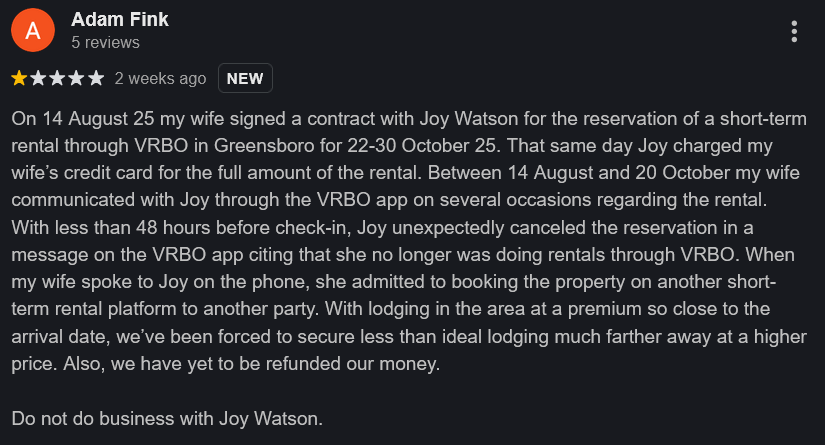Our Review of Hostaway Rental Property Management Software
The Hostaway Experiment: When Automation Becomes A Liability
When we first began looking for a way to build direct bookings and reduce our reliance on Airbnb, we wanted a tool that could sync with our existing Airbnb listings and also connect smoothly to our Squarespace website, where we share all our rental details. On paper, Hostaway looked perfect.
It was marketed as an all-in-one software that could handle direct booking, messaging, calendar syncing, and payouts across multiple platforms like Airbnb, Vrbo, Booking.com, and Google Rentals. We chose Hostaway because it promised to simplify everything — but the reality didn’t match the pitch.
We were still in the onboarding phase when we hit our first snag: no ACH payments. Instead of a simple automated bank transfer, paying from our U.S.-based business account required a clunky manual approval process. Hostaway told us ACH was “in the works.” But in the entire year we used the system, that feature never appeared — and that was just the first of many over-promises and under-delivers.
For small, local hosts like us, who personally manage each stay and guest, this kind of technology can feel like a mismatch. Corporate automation might work for companies managing thousands of properties, but it often leaves independent hosts juggling errors, fees, and faceless, numerical ticket based, tech support located in another non-us based country.
I signed up for Hostaway because I wanted to depend on Airbnb less.
I could see where their corporate model was heading. You only have to look at what happened to Vrbo after it married Expedia to understand what was coming next. Once Vrbo went corporate, hosts became data points and travelers became transactions. Airbnb was starting to show the same signs. Bigger profits, less transparency, fewer protections for small local hosts like us, who actually maintain their homes and communities.
I did not want to get caught in that shift. I wanted to build my own direct booking business and circumvent these corporate rental companies like Airbnb and VRBO. I wanted to communicate directly with guests, set fair policies, and manage relationships without a corporate algorithm.
That is why I signed up for Hostaway. It promised freedom, automation, and control. Instead it gave me international billing chaos, broken promises, and enough liability that I had to add screening and insurance tools from Superhog/Truvi and payment processing through Stripe. Each with their own fees for guests and hosts.
Why bother with a channel manager?
I manage multiple properties in Greensboro, NC. Short term, mid term, and traditional rentals. Syncing calendars across platforms without the assistance of one of these platforms is like juggling knives uphill. For the short term rentals, a channel manager seemed like a good idea.
What Hostaway Promised
Calendar sync for Direct Booking through my Squarespace website, as well as Airbnb, Vrbo, and Booking.com
QuickBooks integration included in the subscription and described as robust
ACH payments supposedly “coming soon” but never arrived
Messaging and guest management automation
The base subscription was over $300 per month for eight listings. Then, on top of that, there was a per listing dynamic pricing fee, per booking fees, international fees on every Stripe payment, and a separate payment processor I had to bring. AND I added in Truvi guest screening/insurance to mimic the AirCover provided by Airbnb. Not only did all of this make business more complicated and time-consuming, but it also made it far more expensive. This, all before factoring in the hourly cost of my time over the months-long learning curve and time I spent setting up all the details on each platform which did not sync from Airbnb which were A LOT.
The hidden costs of automation
Did you know that Hostaway is not based in the US? Hostaway is apparently based in Finland, which makes every single payment from them an “international charge”. My bank flagged every monthly charge as fraud, which required months of back and forth with my bank, just to deal with day-to-day transactions from my rentals. After months of this, Hostaway sent threatening emails that they would suspend my account if I did not pay immediately.
I ended up having to open a business credit card for the sole purpose of paying Hostaway because my bank would not allow those recurring international charges.
Between subscription, add-ons, transaction fees, and months of my time, the real cost was closer to $6,000 dollars for the year.
The customer support was not supportive
Another ongoing issue that led to a lot of frustration for us was that every message we sent to Hostaway asking a question created a new ticket number that as assigned to an entirely new agent who had no idea what was going on with our account, which required we start over in explaining the issue we were having. There was no continuity in getting assistance with our account. Some tickets included a link to a training video that was out of date from the current version of their software, and did not match the fields and page options available to me.
I use Apple products to manage my business, and when accessing my Hostaway account I used Chrome browser, so it could have been that their web-based software was just not compatible with my setup?
One bright spot, was that I was eventually assigned a dedicated support person, Tyra. Without her I would not have made it through the onboarding/setup process, and even with her assistance we still had unresolved issues that were not addressed.
Liability they do not warn you about
Something they don’t really highlight when you are switching to direct bookings is that you now are on the hook for liabilities that are normally included with your Airbnb fees. Direct bookings shift risk to the host. To protect guests and my business I felt I needed to add:
Truvi for guest screening plus guest paid damage and liability coverage. There is a monthly fee and a per booking fee. Guests also pay about 40 dollars for coverage. Human run and helpful.
Special rental insurance with David Wilkins at Allen Tate. Excellent guidance and dialed coverage.
Even with safeguards, the risk was obvious. The platform is no longer the intermediary. You are.
Disconnecting is not a switch
After a years-long struggle full of disappointments and reassessing expectations, we ultimately decided it made more sense to leave Hostaway. The costs were simply outweighing the benefits. Leaving Hostaway took weeks. Multiple online appointments. Manually unsyncing calendars. Rebuilding messages and systems for Airbnb, Vrbo, and Booking.com. Tyra spent hours untangling this with me. I stayed a full year because I planned the learning curve and because she helped.
Hostaway Disconnection Fallout
After the year with Hostaway, I disconnected and closed my Vrbo and booking.com listings. I confirmed the closure in writing with both platforms.
Unfortunately (no one warned us of this), when the sync disconnected, Vrbo software unblocked dates I had manually closed. My listings appeared active, despite not being actually available. I reported the problem many times to customer support. Calls and emails about the mobile app and tools that would not work as designed. Nothing was corrected.
That glitch within VRBO, resulting from Hostaway’s disconnection allowed double-bookings that should not have been possible as the listings were already reserved. One was a booking for one of our properties during the Furniture Market, which is a very popular time to visit and people book out their stays way in advance. Unfortunately, we had to cancel the second booking as soon as we learned of the issue. When the double-booked customer learned of the cancellation she was confused, then angry, then scared about where her group would stay and what it would now cost, considering the popularity of booking during this timeframe for Furniture Market. We genuinely do our best to deliver for all of our clients, and I felt so much empathy for this person while on a train home from Charlotte with weak reception.
I apologized and tried to explain what had happened. Understandably, she was upset and did not want to hear it. I immediately initiated a full refund through the platform and contacted Vrbo support to see if there was anything else we could do. Once a Vrbo account is closed, all payments and refunds must go through Vrbo’s payment processor — not the host — so any delay in receiving that refund was on Vrbo’s end, not mine.
More Fallout
The customer took the booking issue so personally, that despite the booking being made on VRBO, they went out of their way to find me on Airbnb, and sent angry and threatening messages. Then he posted a one-star Google review accusing me of intentionally double booking for more money. We value our returning clients, and would never engage in this type of behavior. The rate we received for the double-booked reservation was identical to the original reservation.
Airbnb let me know that this customer would be informed that no retalliation would be permitted.
They did not mention that the booking occurred after my listings were closed. They did not mention the Vrbo sync failure that unblocked dates. They did not mention that the refund was already in motion.
I have hosted for ten years without a single double booking. Until this moment.
The legal gap for U.S. hosts
Foreign platforms reduce practical protection for U.S. businesses. Hostaway is based in Finland. That means weaker access to U.S. remedies for misleading marketing or billing problems.
Examples that matter to small hosts:
FTC Act Section 5 targets deceptive practices. Harder to enforce across borders.
ROSCA covers online recurring billing and clear cancellation paths. Practical enforcement is limited when billing is international.
State UDAP laws such as the North Carolina Unfair and Deceptive Trade Practices Act. Great on paper, costly to apply to an overseas company.
Meanwhile I must comply with local, state, and federal rules, including ADA considerations for operations open to the public and North Carolina consumer standards. Their billing was global. My liability was local.
Lessons I am taking forward
Automation without accountability creates risk.
Foreign billing invites bank flags, delays, and fees.
Ticket numbers are not support. Actual problems getting resolved without run-around is support.
Protect your reputation first. One negative review can outweigh months or years of five star ratings.
If you choose to do direct bookings in this way, budget for screening and extra insurance from day one.
Back to human hosting
I still use Airbnb. Corporate, yes, but payments, refunds, and screening live in one system. It is not perfect, but it is predictable, and after a decade I know that system very well.
I am focused on human centered hosting. Homes with soul that feel more like a home than a hotel. Clear communication. No ticket mazes.
If you are a small host looking at channel managers, know this. You do not just sign up for convenience. You sign up for liability. And when software goes wrong, you may find yourself doing damage control on your own too.
At Joy Watson Real Estate, we believe efficiency should never come at the cost of human connection. Technology should serve hospitality, not replace it.




